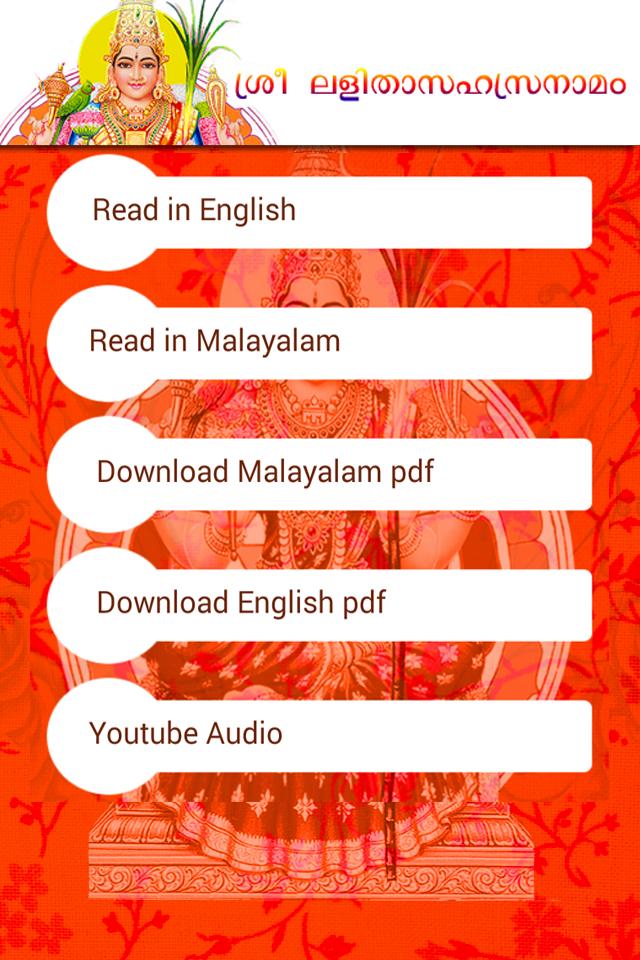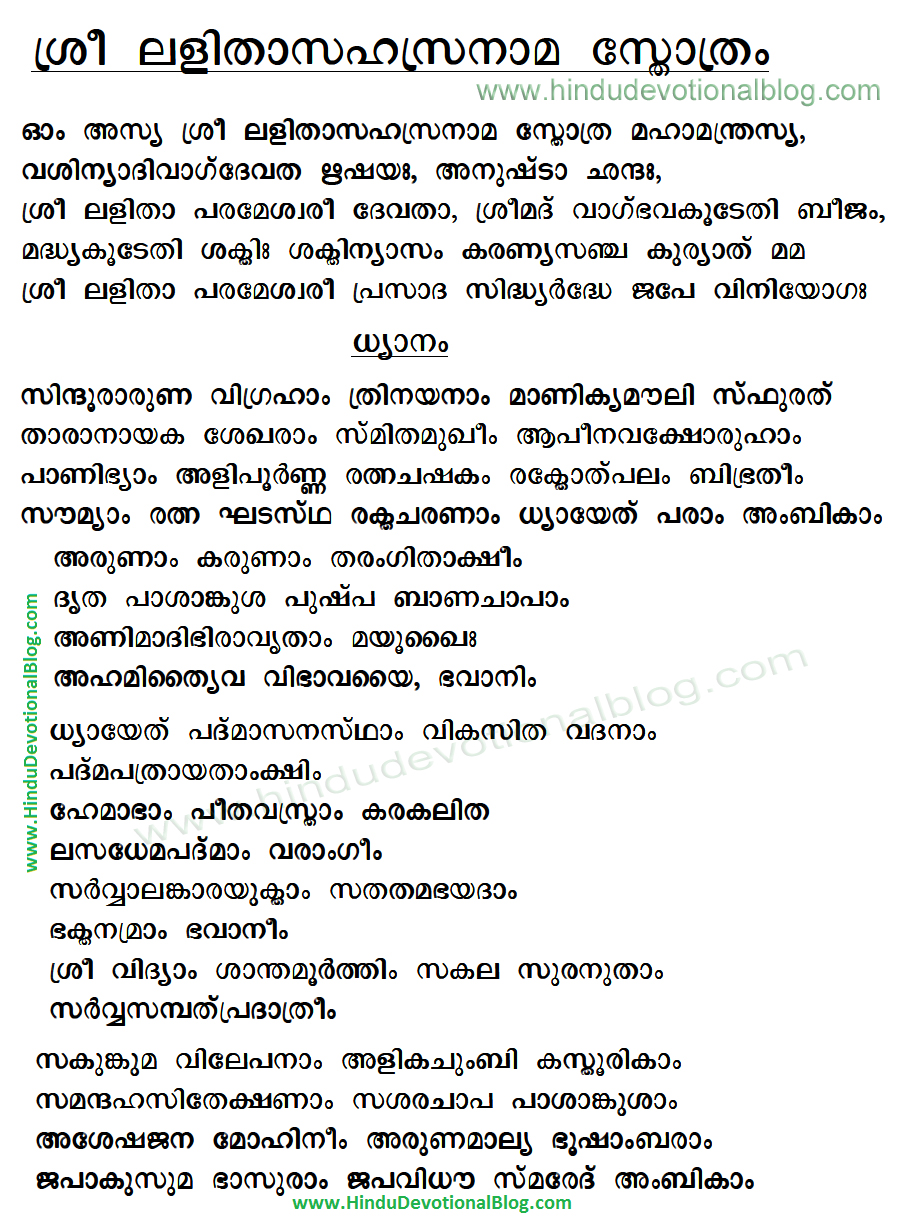Lalita Sahasranama is considered to be most esoteric in nature elaborating the thousand names of Mother Lalita. The greatness of this hymn is such that nothing . Lalita Sahasranama is a text from Brahmanda Purana. It is a sacred text to the Hindu worshippers of the Goddess Lalita Devi, i.e. the Divine Mother or Goddess . Author: A Compilation Publisher: Sri Ramakrishna Math Thrissur Pages: Binding: Paperback.
| Author: | Vozuru Moogutaxe |
| Country: | Jamaica |
| Language: | English (Spanish) |
| Genre: | Business |
| Published (Last): | 5 October 2009 |
| Pages: | 399 |
| PDF File Size: | 6.76 Mb |
| ePub File Size: | 5.19 Mb |
| ISBN: | 768-6-26325-603-7 |
| Downloads: | 32802 |
| Price: | Free* [*Free Regsitration Required] |
| Uploader: | Akizil |
Etymologically, “Lalitha” means “She Who Plays”. In the root form vyutpattithe word “Lalitha” means “spontaneous” from which the meaning “easy” is derived and implicitly extends to “play”. Lalita Sahasranamam contains the thousand names of the Hindu mother goddess Lalita. It is the only sahasranama that does not repeat a single name [ citation needed ]. Further, in order to maintain the meter, sahasranama s generally use the artifice of adding words like tu, api, ca, and hi, which are conjunctions that do not necessarily add to the meaning of the name except in cases of interpretation.
Lalitha sahasranama is said to have been composed by eight vaag devis vaag dhevathas upon the command of Lalitha. Srimad Bhagavatham – Vol. Page 1 of 1 Start over Page 1 of 1. The sahasranama says that “One can worship Lalitha only if she wishes us to do so”. Sri Devi Mahatmyam Malayalam Edition.

The Lalita Sahasranama does not use any such auxiliary conjunctions and is unique in being an enumeration of holy names that meets the metrical, poetical and mystic requirements of a sahasranama by their order throughout the text. Sahasranma sahasranama is said to have been composed by eight vaag devis vaag dhevathas upon the command of Lalitha. The sahasranama says that “One can worship Lalitha only if she wishes us to do so”. The text is a dialogue between Hayagriva an avatar of Mahavishnu and sage Agastya.
- Please make me aware the order in which the three are to be recited I.e Lalitha Trishati, Lalitha Sahasra namam and Phalashruti. Lalitha Trishati can be recited independently. Lalitha Sahasranama stotram can be recited independently or followed by Phalashruti. Only phalashruti is never recited.
- Sri Lalitha Sahasranama Stotram Introduction: Shri Lalita sahasranamam is presented in a name-by-name format with a brief meaning for each name. Each of the 1000 names of Shri Lalita mahatripurasundari is beautiful and has a profound meaning to it. Refer to a detailed commentary and understand the complete meaning of each of these names.
The temple at Thirumeyachurnear Kumbakonamis said to be where Agastya was initiated into this sahasranama. An alternative version is that the Upanishad Bramham Mutt at Kanchipuram is where this initiation happened. This sahasranama is held as a sacred text for the worship of the “Divine Mother”, Lalita, and is used in the worship of Durga malqyalam, ParvatiKaliLakshmiSaraswatiBhagavathietc. A principal text of Shakti worshipersit malqyalam her various attributes, and these names are organized in the form of a hymn.
This sahasranama is used in various modes for the worship of the Divine Mother. Some of the modes of worship are parayana Recitationsarchanahoma etc.
Tag: Lalitha Sahasranamam And Lyrics Malayalam
This stotra hymn of praise occurs in the Brahmanda Purana history of the universe in the chapter of discussion between Hayagreeva and Agasthya. Hayagreeva is an incarnation of Vishnu with the head of a horse who is held to be the storehouse of knowledge. Agasthya is one of the sages of yore and one of the stars of the constellation Saptarishi Ursa major. At the request of Agasthya, Hayagreeva is said to have taught him the thousand holiest names of Lalita.
This has been conveyed to us by the sage Maharishi Vyasa. Lalita Sahasranama is the only sahasranama composed by vagdevatas under Lalita’s direction. All the other sahasranamas are said to have been passed on the writings by Maharishi Vyasa. Note that even before Vyasa many worshipped the Devas with Sahasranamas. Vyasa did not compose sahasranams, but only popularized them through his writings. Paramashiva is one of the trinity of Hindu pantheons, in charge of moksha layam.
He married Satithe daughter of Daksha. Daksha and Shiva did not get along and consequently Daksha did not invite Shiva for one of the great fire sacrifices that he conducted. Daksha insulted her husband and she jumped into the fire and ended her life. This incident upset Paramashiva and he entered into deep meditation.
Sati reincarnated as daughter of Himavatking of the mountains, and his wife, Mena. The devas faced an enemy in Tarakasura who had a boon that he could be killed only by a son of Shiva and Parvati. So, to rouse Shiva from his deep meditation, the devas deputed Kamadevathe God of love who shot his flower arrows at Shiva.
Shiva ended his meditation and in anger for being disturbed, opened his third eye which reduced the God of love to ashes. The Devas and Ratithe wife of Kamadeva requested Shiva to give life to her husband Heeding their request Paramashiva stared at the ashes of Manmatha. From the ashes emanated Bhandasura, who made all the world impotent and ruled from the city called Shonita pura. He started troubling the devas. The devas then sought the advice of Sage Narada who advised them to conduct a fire sacrifice.
From the fire rose Tripura Sundari. In Lalitha Sahasranama, the beginning of the text describes the formless Lalitha with an explicit female form and along with an equally charming consort. This divine couple is named as Kameshwari and Kameswara. Kameswari is described as extremely beautiful, having dark thick long hair with the scent of champakaashoka and punnaga flowers.
She had the musk tilaka on her forehead, eyelids which malyaalam as if they were the gate of the house of the God of love, and having eyes like fish playing in the llita of her face. She had a nose with studs that shone more than the stars, ears with the sun and moon as studs, cheeks which were like the mirror of Padmaragabeautiful rows of white teeth, and she was chewing thambula with camphor.
She had a voice sweeter than the sound emanating from veena of Saraswatiand having such a beautiful smile that Kameswara himself malayala, not take his eyes off her. She was wearing a mangala sutra and necklaces, with beautiful breasts which were capable of buying the invaluable love of Kameswara, having wisps of beautiful hair raising from her belly, her stomach having three pretty folds, and she was wearing red silk tied with a string with red bells.
Buy Sri Lalita Sahasranama Stotram (Malayalam) from at lowest price

She had thighs which steal the heart of Kameswara, knees which looked like crowns made of precious gems, voluptuous legs, upper part of the feet resembling the backs of tortoises, feet which resembled lamps made of gems which could dispel worries from the mind of devotees and a body with the golden red color.
Nagara has 25 streets circling it, made of iron, steel, copper, and lead. An alloy made of five metals, silver, gold, the white stone pushpa ragathe red stone padmaragaonyxdiamond, vaidurya, indranila topazpearl, marakatha, coral, nine gems and a mixture of gems and precious stones.
In the eighth street is a forest of kadambas. This is presided by Syamala. On the fifteenth street lives the eight directional guardian deities. In the sixteenth lives Varahi alias Dandini malayallam was her commander in chief.
Lalitha Sahasranamam Lyrics Malayalam Pdf
Here Syamala also has a house. In the seventeenth street live the different Yoginis. In the eighteenth street lives Maha Vishnu. In the nineteenth street lives Esana, in the twentieth Tara Devi, twenty first Varunithe twenty second Kurukulla who presides over the fort of pride, twenty third Marthanda Bhairavatwenty fourth the moon and twenty fifth Manmatha presiding over the forest of love.
In the center of Nagara is the Maha Padma Vana the great lotus forest and within it the Chintamani Griha The house of holy thoughtin the north east is the Chid agni kunda and on both sides of its eastern gate are the houses of Manthrini and Dhandini. On its four gates stand the Chaduramnaya gods for watch and ward. Within it is the chakra. In the center of the Chakra on the throne of Pancha brahmas on the Bindu Peeta dot plank called sarvanandamaya universal happiness sits Maha Tripura Sundari.
In the chakra are llalita following decorations viz. The devas prayed to her to kill Bhandasura. While Sampatkari was the captain of the elephant regiment, Aswarooda was the captain of the cavalry. The army was commanded by Dhandini riding on the chariot called Giri Chakra assisted by Manthrini riding on the chariot lalia Geya Chakra.
Jwala malini protected the army by creating a fire ring around it. Para Shakthi rode in the center on the chariot of Chakra. The devi created the ten avatars of Vishnu and destroyed them. She killed all his army using Paashupathastra and killed him with Kameshwarasthra. The gods then praised her. She then laliga Manmatha for the good of the world. This story is contained in the first 84 names of the first 34 slokas of Lalitha sahasranama.
Follow the Author
All together it contains one thousand names. This is also called the Rahasya Nama Sahasra the thousand secret names.
Lalitha Sahasranamam Malayalam Pdf File
Reading it, meditating on the meaning of the names would lead to the fulfillment of all the wishes of the devotees. There are basically five works of God pancha krtyam. They are creation srishtiprotection sthitidestruction samhAram malayalamm, hiding thirOdhAnam and blessing anugraham. Devi herself has been described as ” pancha krtya parAyanA ” in the sloka and the five tasks are described as follows:.

Lalitha has designated the five functions to these brahman s.
Sometimes, Devi will take away the life from these five brahmam and make them inactive, performing all the five tasks herself. At that time they will be called “pancha pretam” that is lifeless bodies. Now the first three slokas are: Srimata, the great mother Srishti; Sri Maharajni the great ruler Sthithi; Srimat Simhasaneswari the one who sits on the simhasanam and manages Samharam.
Here there is no direct reference to samharam. Managing here includes creating balance between birth and death. The rest of the slokas cover thirodhanam and anugraham. Now the next namas – “chidhagnikunda sambhutha devakarya samudhyatha” tells us that devi arose from the fire of knowledge to help devas in their task war against asuras – bhandasura.
Lalitha Sahasranamam Pdf Malayalam
From the namAa- Udhyath bhanu sahasraba till sinjanamani manjeera manditha sree padambuja, all her parts like her face, fore head, eyes, mouth, tongue, voice, hands, hip, legs have been described. Thereafter, Devi’s place Chintamani gruhamher war against bandasura, kundalini shakti, her properties such as who can reach her and who cannot, etc. The General picture of the Goddess depicts a Parrot and a Sugarcane stick with her.
Sugarcane represents the sweetness of her mind. From Wikipedia, the free encyclopedia. This article may require cleanup to meet Wikipedia’s quality standards. The specific problem is: In line citations, prose, word choice Please help improve this article if you can. April Learn how and when to remove this template message.
Chronology of Hindu texts. The Religions of India: Archaeological Survey of India, Government of India. Retrieved from ” https: